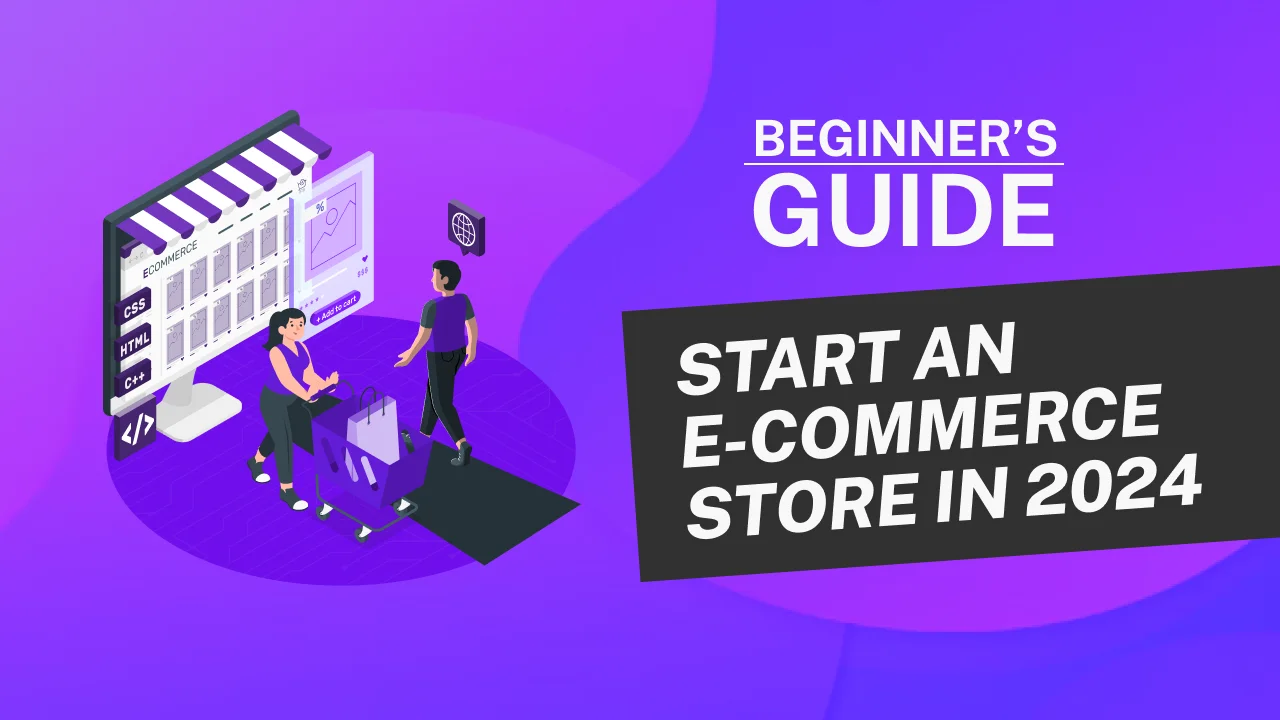
Beginners Guide to Start an E-commerce Store in 2024
Learn how to start an ecommerce store. Discover insights from The Whole Truth Foods' success story and understand the essentials to launch your online store.
E-commerce refers to the online buying and selling of goods and services. While it's been around since 1979, its significance has never been greater than in the 21st century.
The COVID-19 pandemic compelled many of us to stay at home, shifting our shopping habits online and resulting in a significant surge in e-commerce sales. According to research, global e-commerce sales grew by 27.6% in 2020, reaching $4.29 trillion.
E-commerce serves as a dual benefit, offering consumers a convenient and secure shopping experience while empowering businesses to tap into new markets, lower operational expenses, and build stronger customer relationships.
In this blog, we will explore 8 reasons why e-commerce is important for your business and how you can use it to grow your brand.
E-commerce is critical in modern business, covering the sale of both products and services digitally. It suits every business, especially considering the high level of competition in the market.
In a physical store, the necessity for a physical space to store products needs the additional responsibility of maintaining both the premises and inventory, often requiring the employment of workers whose wages must be accounted for.
However, in an e-commerce store, the sole requirement is a website for product showcasing, which can be managed independently at all times. This autonomy allows for efficient self-management and on-demand attention.
Moreover, an e-commerce platform facilitates brand showcasing, provision of value-added services, and customer engagement, especially when complemented by effective marketing strategies.
To gain a deeper understanding of e-commerce before making a decision, explore the following reasons, which explain its importance.
Here are the 8 reasons why e-commerce is important:
By entering into online sales, you can extend your reach to a broader audience actively seeking your products or services.
Furthermore, you gain the flexibility to offer a diverse array of products or services, competitive pricing, and adaptable payment solutions, all of which serve to attract and retain customers effectively.
Optimizing your product pricing under current market conditions can further broaden your customer base and enhance product visibility.
Moreover, utilizing email marketing strategies, such as sending newsletters with attractive discounts and incentives, can effectively engage potential customers and encourage repeat purchases.
Additionally, prioritizing the enhancement of user experience by ensuring fast loading times, intuitive navigation, and mobile compatibility fosters greater customer satisfaction and loyalty.
You can avoid the need for physical stores, inventory, and staff by selling online. You can also save on marketing and advertising expenses by using digital channels and tools that are available for free.
E-commerce helps you improve your cash flow and profitability by reducing the risk of overstocking, understocking, or theft. You can also automate your order processing, invoicing, and shipping, which can save you time and money.
Accessing evolving markets, engage with new customer segments, and increase your brand awareness and recognition by selling online.
You can also take advantage of the growing demand for online shopping, especially in developing countries and regions.
E-commerce helps you overcome the barriers and challenges of international trade, such as tariffs, taxes, regulations, and logistics, by utilizing online platforms and tools to facilitate your global operations, including translation, currency conversion, payment processing, and shipping.
In any business, fostering customer loyalty is important. Just as in a physical store where excellent customer service, immediate responses to inquiries, and addressing concerns contribute to customer satisfaction and repeat business.
E-commerce similarly benefits from attentive customer support and ensuring a seamless shopping experience. Satisfied customers are more willing to return and establish trust in your brand.
Moreover, you can increase customer loyalty by providing personalized recommendations, incorporating customer reviews, and adjusting support based on individual behaviors, preferences, and feedback.
Furthermore, building a community and developing a loyal fan base around your brand through active engagement on social media, blogs, and newsletters is essential.
Rewarding loyal customers with discounts, coupons, freebies, or referral programs further strengthens their commitment to your brand.
Offering customers a convenient, fast, seamless, and secure shopping experience by selling online involves providing a user-friendly and attractive online store with clear and detailed product or service descriptions, images, and videos.
Additionally, incorporating multiple features and functionalities, such as search options, filters, wish lists, carts, and streamlined checkout processes, enhances the overall shopping experience.
E-commerce also helps you enhance customer service and support by offering various options, such as live chat, email, phone, or chatbot.
Furthermore, utilizing online platforms and tools to monitor and measure customer satisfaction and feedback, including surveys, ratings, reviews, and testimonials, is important for continuous improvement.
Utilizing various digital channels and tools to promote your products or services, including websites, social media, email, blogs, podcasts, videos, or webinars, and using online platforms and tools to optimize your marketing campaigns, such as SEO, SEM, PPC, SMM, or email marketing, is essential.
E-commerce enables you to target and segment your customers based on their demographics, psychographics, behavior, and location.
Additionally, utilizing online platforms and tools to track and analyze your marketing performance and results, such as Google Analytics, Facebook Insights, or Mailchimp, is essential.
Creating a unique and attractive online store involves incorporating your logo, design, theme, and layout.
Additionally, offering value-added services such as free shipping, returns, or warranties, and showcasing your brand’s values, mission, and vision on your online store, helps convey your brand’s story and purpose.
E-commerce facilitates innovation and experimentation with your online store's new products or services, features, and functionalities. You can also test and validate your ideas and approaches with your customers, gathering their feedback and suggestions.
Offering your products or services to anyone, anywhere, at any time by selling online, regardless of the distance and time zone.
You can also accommodate multiple customer segments and preferences by offering multiple languages, currencies, and delivery options.
E-commerce helps you increase your customer satisfaction and loyalty by providing fast and reliable service, easy and secure checkout, and timely and polite communication.
Physical stores still offer some advantages in today's market. Customers have the opportunity to physically interact with products, facilitating a tangible shopping experience. Additionally, for urgent needs, customers can conveniently visit the store and make immediate purchases.
In contrast, e-commerce presents the opportunity to sell both physical and digital products online with significantly lower investment compared to physical stores. The absence of direct customer handling soothes concerns, as customers can simply access the website via their smartphones and place orders from anywhere, whether it be for food or footwear.
This convenience not only enhances the shopping experience but also contributes to reducing travel expenses, traffic congestion, pollution, and overall time and monetary expenditures.
Therefore, e-commerce stands as a pivotal component of today's business world.
If you're considering launching your own e-commerce site, we invite you to visit zbiz.io. Our team will assist you in creating your site from scratch to launch.

Learn how to start an ecommerce store. Discover insights from The Whole Truth Foods' success story and understand the essentials to launch your online store.

Find the best free stock images, photos, and videos for your social media content. Discover the top 5 websites offering diverse and high-quality assets

Make your videos stand out with free music and sound effects! Explore our list of 8 websites offering high-quality audio resources for your video projects